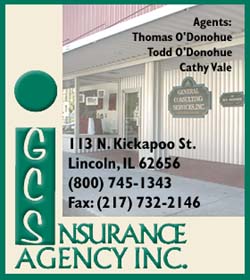|
Lincoln
Junior High and Lincoln Community High School students were asked to
stop by and sign a pledge sheet to remain drug and alcohol-free for
the 2000-01 school year. Ninety students made the pledge, including
two Lincoln High School football players who dropped by to make their
pledge during a break in practice. Students who signed the pledge were
given a T-shirt donated by Lincoln’s City Council.
The
HYPE organization was established in cooperation with the Logan Mason
Mental Health Department three years ago. Christy Simpson, the
department’s prevention specialist, is the group’s organizer.
Thirteen-year-old
Bo Wright, a member of HYPE, said, "I joined the group because it
was fun and because I get to help out a lot."
HYPE
does community service activities throughout Lincoln. It has worked
with the Habitat for Humanity Project, helping to build homes for
people in need of affordable housing. Members have led food drives for
Lincoln’s food pantry, and they have participated in the
adopt-a-grandparent program at St. Clara’s Manor, a long-term care
center. They also perform prevention theatre puppet shows, according
to Simpson.

Lincoln
Community High School has a similar program called Snowball. They also
do projects for the community. Both groups are open to all students,
and individuals may join at any time. There are 25 students in HYPE
and 30 in the Snowball program.
Sarah
Koehne, 14, a Lincoln Community High School student, said, "I
joined the group because it was alcohol-free and because it did
community service projects like helping to do work at the former Odd
Fellows Day Care Center (site). I like helping people."
(To top of second
column in this article)
|
According
to the National Institute on Alcohol Abuse and Alcoholism, the use of
alcohol or other drugs at an early age is an indicator of future
alcohol or drug problems. The report says that people who begin
drinking before age 15 are four times more likely to develop
alcoholism than those who begin at 21.

Data
from a National Council on Alcoholism and Drug Dependence publication
reports that 80 percent of high school seniors have used alcohol. In
comparison, 65 percent have smoked cigarettes, 50 percent have used
marijuana and 10 percent have used cocaine. The use of alcohol and
other drugs is associated with the leading causes of death and injury
(e.g., motor-vehicle crashes, homicides and suicides) among teenagers
and young adults. Junior/middle and senior high school students drink
35 percent of all wine coolers sold in the United States; they also
consume 1.1 billion cans of beer.
Teenagers
whose parents talk to them regularly about the dangers of drugs are 42
percent less likely to use drugs than those whose parents don’t, yet
only one in four teens reports having these conversations, according
to a Partnership for a Drug-Free America release.
The
HYPE group is financially sponsored by local businesses.
[Kym
Ammons-Scott]
|
|
Since
only approximately $67,500 will be realized from the tax levy this
year, the finance committee must prioritize the requests and decide
how much funding to recommend the County Board grant to each
organization. The .025 tax levy was approved at a March 21 referendum.
Judy
Donath, executive director of Oasis, asked the committee to consider
giving the organization a total of $80,956 – $29,826 for general
expenses of maintaining the center, such as utilities, upkeep and
insurance; $20,130 for programs and services; and $31,000 for a new
15-passenger van. The programs and services include hiring a part-time
secretary/bookkeeper and initiating new programs, a grandparents-raising-grandchildren support group, trained volunteers
to visit shut-ins, and Senior Olympics.

Donath
said the Oasis group, which at present has no tax-supported funding,
has had to dedicate most of its time to fund raising to support
itself. Much of the funding has been generated from bingo games at the
Recreation Center, staffed by the same group of volunteers, she said,
and the volunteers are getting tired of staffing these games.
"We
would like to move forward to better serve senior citizens of Logan
County," she told the board.
Donath
also noted that the Oasis van is not used to take seniors to gambling
casinos. "Tri-State Tours brings a bus to the Oasis to take
seniors to Paradice," she said. "The casino pays the bus
company. The $5 the seniors pay is a fund-raiser and stays at
Oasis."
Jane
Poertner, executive director of CIEDC, and Mary Elston, deputy
director of Senior Services, asked for a total of $45,000 – $15,000
each for three programs: senior nutrition, transportation and adult
day care.
The
organization reported a deficit of $14,909 in its senior nutrition
program, which provides both home-delivered meals and meals at
congregate dining sites. Home-delivered meals go to Lincoln, Atlanta,
Lawndale, Mount Pulaski, Chestnut, Beason, Emden, San Jose, Latham,
New Holland and Middletown. Congregate dining sites serve Lincoln,
Mount Pulaski, Emden, Beason and Latham, with Beason and Latham
receiving meals only one day a week and the other sites five.
Elston
said the senior nutrition program served 42,815 meals last year in
Logan county, almost 30,000 of which were home delivered to "the
most frail and needy senior citizens."
She
told the committee CIEDC has a $17,962 deficit in the transportation
program, which provides seniors rides to hospitals, nursing homes,
medical appointments, congregate dining sites, Oasis, beauty and
barber shops, banks, Wal-Mart and employment-related activities. She
said 81 percent of the transportation services goes to seniors over
the age of 70.

The
adult day-care program, Elston said, has a deficit of $27,482. Ten
clients are enrolled, with four more referrals pending. Poertner said
if the day-care program, which is supported by state payments, private
payments and co-payments, had 24 participants it would be able to pay
for itself.
County
Board Chairman Darrell Deverman asked Poertner if she could prioritize
the needs of her organization, but she said she would prefer not to
choose between programs. "I would not want to see you starve all
three programs," she told the committee.
(To top of second
column in this article)
|

Board
member Dick Hurley noted that CIEDC serves seniors in six counties,
and asked what part of the budget serves Logan County. Poertner said
the figures given the finance committee were for Logan County only.
She said 90 percent of the transportation furnished by CIEDC goes to
Logan and Mason counties, and 80 percent of the nutrition services go
to Logan County.
Board
member Roger Bock asked if Oasis and CIEDC could work out an
arrangement to share a van. Poertner said she had been in negotiation
with Oasis, but said her facility uses the van during the day and
Oasis would only be able to use it evenings and weekends. Vans for
CIEDC are purchased with grants from the Illinois Department of
Transportation.
Dayle
Eldredge of the Rural Health Partnership asked for $25,000 to help
offset the operating expenses of the Rural Health Van, a mobile unit
which serves rural communities in the county. She said the request was
"a possible one-time grant. We hope over the next three years to
establish an endowment fund to allow us to be totally self-sufficient.
We don’t anticipate asking for funds year after year," she
said.
The
mobile unit performs approximately 750 functions per month, with 59 to
69 percent of its patients over age 65. Expenses this year were
$145,000 and revenue only $13,000, she told the committee. The Rural
Health Van is a new program, never attempted in the United States
before, and there were no precedents to help determine how much
revenue it would generate, Eldredge said.
Committee
members raised several questions, such as determining eligibility for
the funding and establishing priorities which best meet the criteria
stated in the referendum. Several members suggested that all three
organizations be funded at some level.
Rodney
White, finance committee chairman, explained that the county
will probably levy only 75 percent of the tax this year. "The
reason we looked at not assessing the maximum rate is to keep the
funding level steady. Farmland assessment is going to start turning
down. If assessed valuation goes down, taxes collected will also go
down."

Finance
committee member Clifford Sullivan pointed out another reason for
assessing only 75 percent of the tax. "If other organizations
request funds in the future, we wouldn’t have any dollars to fund
them. We would not want to cut funding levels for existing
organizations to fund new ones."
If
other Logan County organizations do wish to make requests, the finance
committee will hear them at two meetings next week, one Wednesday
starting at 8 a.m. and another Thursday starting at 1 p.m. The
committee will make a recommendation to the full County Board, which
will make the final funding decisions and has the authority to change
the finance committee’s recommendations, Sullivan said.
"We
would like to fund all three organizations, and we’d love to fund
them at 100 percent of what they ask," Sullivan told the Lincoln
Daily News. "But if you’ve only got a five-pound bag, you
can’t put 10 pounds in it."
[Joan
Crabb]
|



